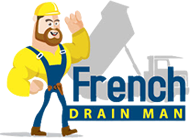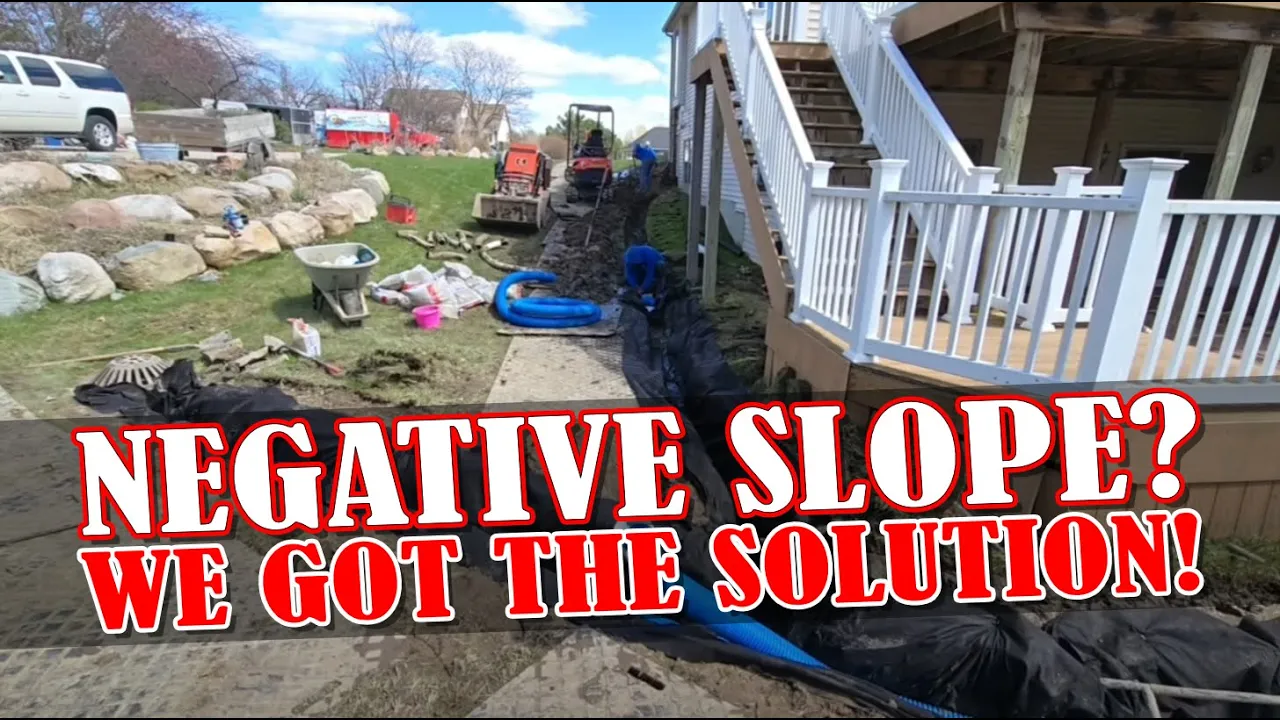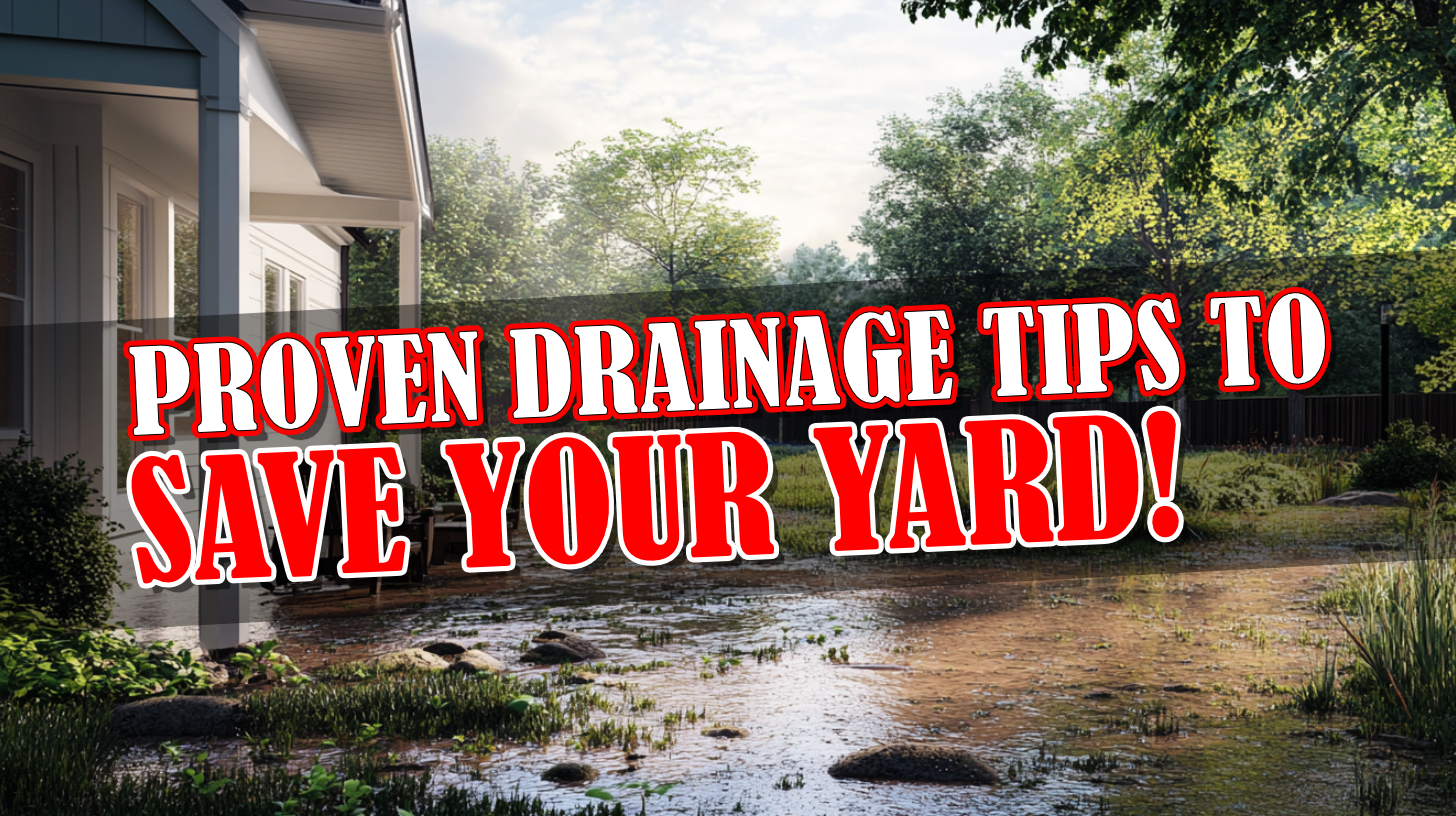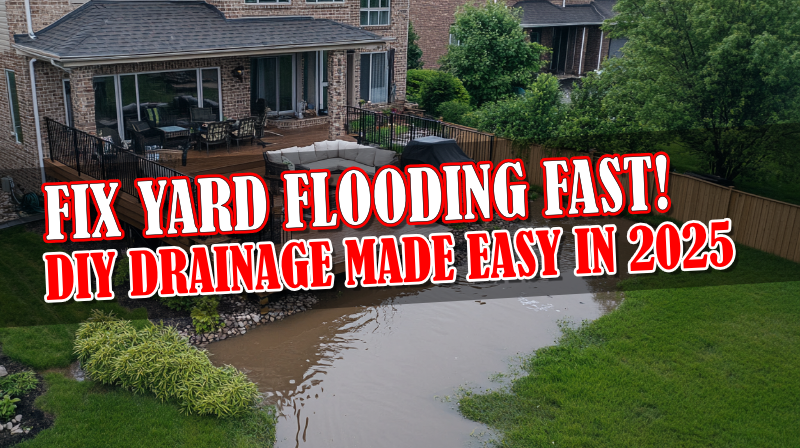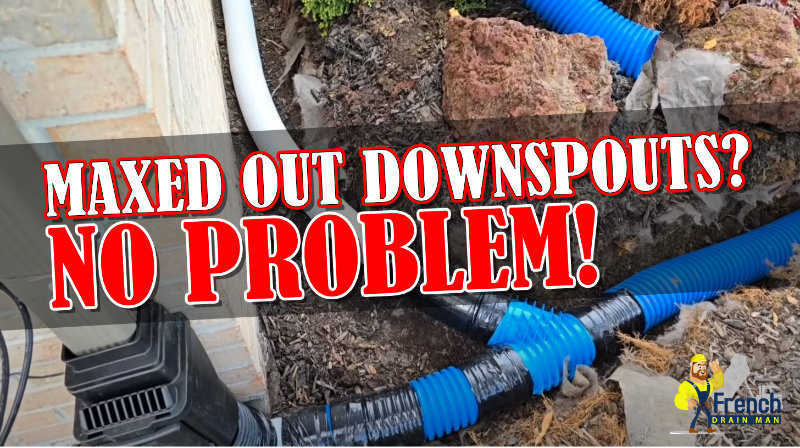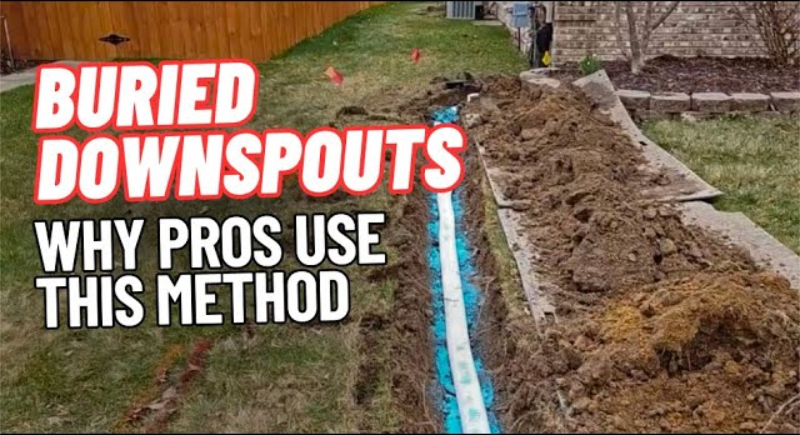Searching for a Drainage Contractor in Sterling Heights, Michigan
Are you a Sterling Heights homeowner suffering from a soggy lawn, a flooded basement, or pooling water in your yard? You aren’t alone—drainage problems are incredibly prevalent here due to Michigan’s heavy rainfall, clay-rich soils, and unpredictable weather patterns. But don’t despair; hiring the appropriate drainage expert can transform a soggy landscape into a dry, healthy space! This comprehensive guide provides all the information necessary for hiring an ideal drainage specialist in Sterling Heights.
Understanding Drainage Problems in Sterling Heights
Before you can solve a problem, it’s essential to understand it first. Here are the most frequent drainage issues plaguing Sterling Heights homes:
- Clay Soil: Michigan yards often feature dense and sticky clay soil, which makes water hard to percolate, leading to pooling and runoff.
- Flat or Negative Slope: If your yard slopes toward your home and lacks sufficient grading, water may pool near its foundation and collect in pools around its base.
- Heavy Rainfall and Snowmelt: Michigan’s climate brings ample precipitation, creating additional strain on drainage systems and exacerbating existing issues.
- Poorly Installed or Outdated Drainage Systems: Even if your home already features a drainage system, it could be outdated, damaged, or improperly installed and thus rendered ineffective.
Why Hiring a Drainage Contractor Is Necessary (and DIY Doesn’t Always Provide the Solution)
Some minor drainage issues can be resolved with DIY solutions; however, most require the expertise of a professional drainage contractor. Here’s why:
- Expertise: Drainage contractors possess the experience and know-how to diagnose the source of your drainage issue and create a solution.
- Equipment: They possess access to specialized tools and equipment for complex drainage projects such as excavation and pipe installation.
- Professionalism: Professionals can complete work quickly and efficiently, saving you time and frustration.
- Long-Term Solutions: Working with a drainage contractor can create long-term solutions for any existing issues or prevent any new ones, protecting your investment and keeping things running smoothly.
- Permits and Regulations: They understand local building codes, so your drainage system complies with all regulations.
What to Look For in a Drainage Contractor
Selecting an experienced drainage contractor is critical to any successful drainage project. When reviewing potential contractors, here are some factors you should take into account:
- Licensing and Insurance: Before hiring any contractor, be sure they are licensed and insured in case of accidents or property damage. Doing this protects you from being held liable.
- Experience and Expertise: Choose a contractor with a history of completed drainage projects in Sterling Heights.
- Reputation and Reviews: Check online reviews to assess a contractor’s reputation and customer satisfaction.
- Services Offered: When hiring a contractor, ensure they offer services tailored to your specific needs, such as French drains, sump pumps, grading, or any other possible solutions.
- Transparent Pricing: To avoid surprises later, give a written estimate of any work needed prior to initiating any projects.
- Warranties and Guarantees: Any reliable contractor should stand behind their work with warranties for materials and labor.
Red Flags to Watch Out For
Be wary of drainage contractors who:
- Use aggressive sales techniques or offer deals that seem too good to be true.
- Give vague estimates or refuse to provide details in writing.
- Be wary of online reviews with no or negative references.
- Offer unclear pricing or try to sell unnecessary services.
- Do not possess the proper licensing or insurance.
The French Drain Man Difference
As a homeowner, you must know of any possible complications caused by French drains. While they provide an efficient means for managing excess water, several factors could lead to their failure – these could include:
- Clogged Drains: Over time, leaves, dirt, and roots can clog drains, impeding water flow and rendering it ineffective.
- Installation Error: If the French drain is installed improperly regarding slope, depth, and materials, it won’t function as intended.
- Lack of Maintenance: To function effectively, French drains require regular inspection and cleaning.
By being aware of these potential pitfalls, homeowners can proactively avoid French drain failure and protect their investments.
To ensure the long-term functionality of a French drain system, quality materials must be used, installed by qualified professionals, and regularly maintained.
Common Causes of Standing Water
Before attempting to solve drainage problems, you must identify their cause. Here are some of the more likely reasons:
- Compacted Soil: Heavy foot traffic, construction, or even the natural settling of soil can compact it to such an extent that water cannot easily permeate it.
- Poor Grading: If your yard slopes towards your house or contains depressions where water collects, that could create drainage issues.
- Blocked Drains: Leaves, debris, or tree roots can clog your gutters, downspouts, and underground drains with debris that prevents water from moving freely through them. This obstructs the proper functioning of these systems, as water must pass freely.
- Heavy Rainfall and Snowmelt: Michigan can experience intense rainfall and snowmelt that can overwhelm even the best drainage system. Michigan weather conditions can be harsh, bringing torrents of precipitation that quickly become waterways of ice overflowing their banks during snowmelt season.
Soil Composition and its Effect on Drainage Systems
Your soil type plays an essential role in how efficiently your yard drains. Here in Sterling Heights, clay soil is often to blame for drainage problems because it is dense and slow-draining. It holds onto moisture that accumulates for too long and leads to soggy conditions in your garden.
Understanding your soil type is integral to selecting an effective drainage solution. A soil test will reveal its composition and allow you to take practical action.
Landscaping and Garden Design Mistakes that Compromise Drainage
Your landscaping could contribute to drainage problems! Common missteps include:
- Overwatering: Overly generous irrigation may saturate clay-rich soils with too much moisture, leading to irreparable damage and, eventually, the devastation of plants and crops.
- Improperly Placed Plants: When trees and shrubs are placed too near your home, they can block sunlight from reaching the soil, inhibit its ability to dry out properly, and potentially damage underground drains due to their roots.
- Lack of Drainage Solutions: Without drainage solutions such as swales, dry wells, and rain gardens in your landscape design plan, water may find no outlet other than to pool in one or both spots of your yard.
Impacts of Weather and Seasonal Changes on Business Operations
Michigan weather can be fickle, which enormously affects yard drainage. Heavy spring rains and snowmelt can easily overwhelm your drainage system, while hot, dry summers can cause the ground to crack and shrink, opening new pathways for water seepage into basements.
It is crucial to consider seasonal variations in your drainage solution design. A system that works effectively in spring may not be sufficient for winter or summer’s unique challenges.
Structural Issues and Their Consequences
Construction decisions can directly affect drainage in your home. Patios, decks, walkways, and driveways may create impervious surfaces that prevent rainwater from percolating into the soil, leading to extra runoff that overwhelms gutters and downspouts.
Additionally, if your foundation isn’t adequately waterproofed, water may seep through cracks and cause further damage to the home. Therefore, any structural issues contributing to drainage problems must be resolved as soon as possible.
Innovative Solutions to Prevent Standing Water in Sterling Heights Yard
You have identified drainage issues in your Sterling Heights yard, but you are wondering which are the best solutions. Below, we explore some popular and efficient drainage options:
French Drains Are Yard Drainage Workhorses
French drains have long been considered effective for managing flooding issues in residential areas. These underground trenches containing gravel and perforated pipes work wonders at intercepting and redirecting excess water away from problem spots.
French Drain Man stands out by using high-grade corrugated HDPE pipe built to last. It also pays special attention to slope and filter fabric installation to prevent clogs and ensure years of trouble-free drain operation.
A French Drain Shines Bright:
- Basements: If water is seeping into your basement, installing a French drain along its foundation could intercept it before reaching your walls and becoming an issue.
- Flat Yards: French drains allow excess water to move away from your home, creating an effective drainage solution in yards with little or no slope.
- Landscaping: French drains can be installed around patios, walkways, and retaining walls to help prevent water damage and soil erosion.
Swales: Gentle Giants of Drainage
Swales are shallow, gently sloped ditches designed to work with nature to manage water flow. They blend beautifully into any landscape, featuring native vegetation for additional beauty and erosion control.
Swales Are Ideal for:
- Large Areas: Swales can help manage runoff from large surfaces like driveways and lawns effectively.
- Negative Slopes: If the slope in your yard slopes towards your house, installing a swale may help divert excess water away from its foundation and into nearby rivers and creeks.
- Naturalistic Landscaping: Swales add natural beauty while providing essential drainage.
Dry Wells: Underground Reservoirs
Dry wells are underground structures designed to collect and store excess water before slowly seeping back into the earth’s surface. They may be combined with other drainage solutions like French drains or gutters for optimal use.
When Dry Wells Are Ideal
- Space Limitations: Dry wells provide an ideal option in smaller yards where space is at a premium.
- Downspout Drainage: Drains can efficiently manage large volumes of downspout water without flooding your yard, while dry wells help manage stormwater runoff more efficiently and reduce municipal storm sewer system loads. Catch Basins Protect Your Gutters
- Stormwater Management: Catch basins are strategically installed at the bottom of downspouts to collect rainwater and debris accumulating at their bases, helping prevent clogs while diverting it away from your home’s foundation.
Where Catch Basins Can Be Essential
- Foundation Protection: Catch basins can prevent water from pooling around your foundation and increasing its risk of seepage and damage, helping to ensure it doesn’t seep into it and damage its base.
- Downspout Maintenance: Downspouts provide an essential service by collecting leaves, twigs, and debris accumulating on them, reducing the need for frequent gutter cleaning.
Grading: The Foundation of Good Drainage
Sometimes, the easiest and most effective solution is simply reconfiguring the land. Grading involves altering its slope so water will flow away from your home and other structures in your yard.
When to Consider Grading
- Slope Issues: Regrading may often be the most effective solution for steep slope issues in your yard.
- Poorly Draining Areas: One way to address poor drainage is to improve it by filling in low spots and creating gentle slopes.
- Grading for New Construction: Accurate grading is crucial when starting new construction to avoid drainage problems from day one.
DIY or Professional Drainage Solutions?
Simple drainage projects may be handled independently, while more complex issues often necessitate professional drainage services. Here are some factors to keep in mind when hiring one:
- The complexity of the Problem: If floodwater, foundation damage, or complex soil issues continue to cause problems, it would be prudent to consult a professional.
- Experience and Expertise: Drainage contractors possess the tools to diagnose problems with drainage systems and devise comprehensive solutions accurately.
- Permits and Regulations: Some drainage projects require permits, and working with an expert will ensure your system complies with local regulations.
- Consider Cost Considerations: While DIY might appear cheaper initially, improper execution could result in more costly repairs. Professional services often save more in the long run.
- Liability: Should an attempted DIY drainage project go awry and result in damage to both your property and that of neighbors, you could be held liable. Professionals carry insurance policies designed to cover such risks.
Hiring professionals provides peace of mind that the job will be completed correctly, and an excellent warranty is in place to back it up. Relax, knowing your drainage issue is in safe hands.
DIY May Be an Appropriate Option
There may be instances in which taking a DIY approach can be successful, particularly for dealing with minor drainage issues. Here are a few examples:
- Small Projects: For smaller-scale projects like standing water or downspout issues, essential tools and materials may be all that is necessary to complete them independently.
- Surface Drainage: Homeowners who need surface drainage solutions often find DIY-friendly solutions such as extending downspouts, installing rain barrels, or creating easy swale viable solutions.
- Experience and Confidence: DIY could be viable if you have experience in landscaping or home improvement projects and feel confident about taking them on yourself.
How to Select an Appropriate Drainage Contractor in Sterling Heights
If you have decided to hire a professional, you must choose one who meets your requirements. Here are some helpful hints:
- Do Your Research: Obtain referrals from friends, neighbors, and local gardening groups, as well as online reviews and ratings to gauge a contractor’s reputation.
- Get Multiple Quotes: Contact contractors to compare costs and services before selecting. Don’t just settle for the cheapest option – seek to balance quality and affordability when choosing your service provider.
- Ask the Right Questions: It is essential to inquire about a contractor’s experience, licensing, insurance and warranties, and references from past work completed by them.
- Check for Certifications: When choosing contractors, look for those certified by organizations such as the National Association of Landscape Professionals (NALP) or Irrigation Association.
- Trust Your Gut: Find a contractor you feel comfortable with who understands your home or office’s drainage requirements.
The French Drain Man Advantage
At French Drain Man, we take great pride in being the leading drainage experts in Sterling Heights. We provide various drainage solutions for your needs, such as French drains, sump pumps, catch basins, dry wells, grading services, and more. Our experienced professionals strive to deliver outstanding service that ensures complete customer satisfaction.
We understand the unique drainage challenges experienced by Sterling Heights residents and are equipped to address them effectively. We use only high-grade materials and employ cutting-edge techniques for your system’s construction—and we stand behind it all to guarantee long-term performance.
Don’t Let Drainage Issues Flood Your Yard!
Are you fed up with soggy lawns, flooded basements, and poor drainage? French Drain Man can help! Contact us for a complimentary consultation to assess your property, discuss available solutions, and tailor one to meet your budget and needs. Let us transform your yard into an inviting dry space – contact French Drain Man at and take charge!



